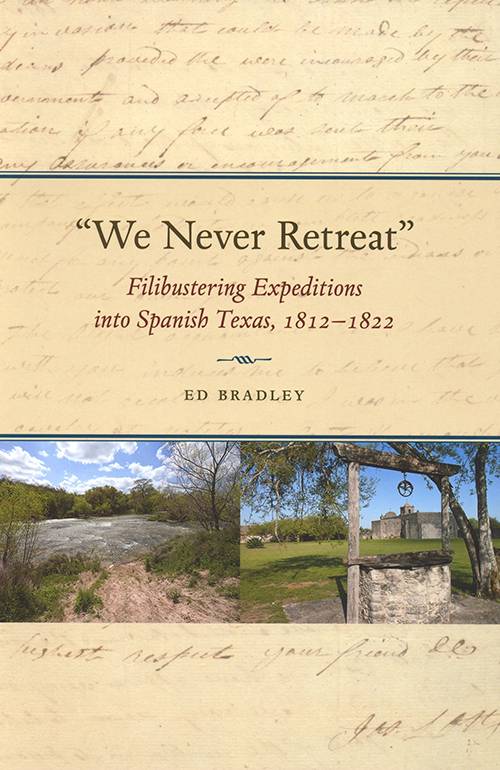Looking for Adventure

“We Never Retreat”: Filibustering Expeditions into Spanish Texas, 1812-1822
by Ed Bradley
College Station: Texas A&M University Press, 2015
344 pp. $49.00 cloth
Reviewed by
Heather M. Haley
The term ‘filibuster’ immediately elicits images of the iconic 1939 film Mr. Smith Goes to Washington, with a disheveled and exhausted James Stewart reciting the United States Constitution to a room sparsely filled with legislators as a means to block legislation. While Frank Capra’s film visualizes the modern association with the term, author Ed Bradley reasserts the nineteenth century definition, as private military invasions into foreign territory, in “We Never Retreat”: Filibustering Expeditions into Spanish Texas, 1812-1822. Applying historian Robert E. May’s contemporary definition, Bradley concludes that most filibusters of the Early National Period were privately funded American men who participated in premeditated military incursions into Spanish Texas.
For those unfamiliar with the filibustering history into Spanish Texas, this book will be of immense value as Bradley places four expeditions within the broader historical context of the Early National Period. Intended as an analysis of early filibusters into Texas, “We Never Retreat” consists of four narratives about the politics and personalities involved in each expedition. Therefore, repetition of historical context occurs throughout the book. In the deconstruction of each case study, Bradley’s book serves as an invaluable resource. Written in narrative form, the author delineates the stories of the early nineteenth century filibusters Philip Nolan, John H. Robinson, James Long, and Augustus William Magee and his association with Mexican diplomat Bernardo Gutierrez de Lara. In addition to providing the narrative of these individuals and their exploits into Spanish Texas, Bradley investigates individual motivations behind their actions and the extent to which the U.S. government offered support.
Weaving the historiography into each case study, including historical novels based on the Magee-Gutierrez expedition such as Timothy Flint’s Frances Berrain, or the Mexican Patriot and Hiram McClane’s Irene Viesca, Bradley indicates common, often congruent motivations for Texas filibustering. American explorer Zebulon Pike noted that Texas was “one of the richest, most prolific, and best watered countries in North America,” with fertile soil and abundant deposits of iron, copper, lead, silver, gold, and platinum. Texas filibusters, especially those of the Magee-Gutierrez expedition, sought livestock for trade with local natives, including the Comanches. While the furtherance of republican virtues is often overemphasized in the historiography as an impetus of Spanish Texas filibusters, Bradley suggests that it certainly may have been a motivation, coupled with regional settlement, personal aggrandizement, and the accumulation of wealth.
While Bradley’s analysis of the American filibuster’s motivations compliments the larger historical narrative of American expansion, he largely ignores the voices of the Tejanos who volunteered for such expeditions. While the narratives of notable military officers and revolutionaries José Bernardo Gutierrez and José Menchaca are well documented, Bradley fails to include those of Spanish subordinates. This leaves the reader questioning their motivations for enlisting in American filibustering incursions. Bradley’s analysis would be more balanced with the inclusion of more Spanish and Tejano sources.
What sets “We Never Retreat” apart from the existing scholarship is Bradley’s assessment of the U.S. government’s involvement in the expeditions. In addressing such sanctioning, Bradley argues that the Madison and Monroe administrations were “somewhat” responsible for the Texas filibusters, “even if they did not directly support them.” His conclusion is well-supported and documented as he criticizes both administrations for not acting as quickly as they could have to prevent the Magee-Gutierrez and Long expeditions. Even Spanish officials noted in 1803 that the U.S. government was “the most ambitious, restless, unsteady, caviling and meddlesome government on earth.” For over thirty years, the United States endured a strained relationship with Spain—especially after the Spanish failure to ratify the Adams-Onís Treaty of 1819 within the specified six months, which evoked rumors of war. Within this greater historical context of discordant relations, Bradley concludes that the federal government simply tolerated Texas filibusters.
By concentrating on each personality, Bradley makes it easy for readers to apply the earliest signs of Manifest Destiny ideology to each expedition. However, Bradley cautions readers not to confuse the filibustering expeditions of the early nineteenth century as precursors to Manifest Destiny because it remains unclear if Magee, Robinson, Perry, and Long sought to annex Texas to the United States. While Bradley’s study suggests that Texas filibusters were little more than irregular military adventurers who sought plunder, his analysis is incongruent with that of historian Robert E. May. In his seminal work Manifest Destiny’s Underworld: Filibustering in Antebellum America, May concludes that filibusters conducted themselves within the context of the growing sectional conflict over slavery, and therefore operated with the overt intention to add territory to the union. While Bradley relies upon May’s definition to validate his claims, he simultaneously ignores this essential component of the term’s definition. Thus, his argument is left wanting as it is limited to the boundaries of this narrow definition.
Heather M. Haley is a graduate teaching fellow in the History Department at Texas State University with research interests in American military history.
